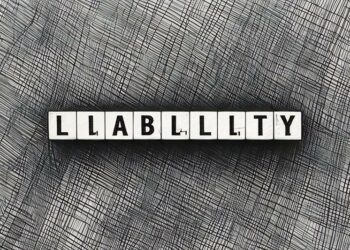Table of Contents
Business liability is a broad type of insurance designed to protect businesses against a range of instances where the company is found liable for causing injury or illness to a client, member of the public or other third party, or damaging their property in some way. These kinds of claims can include incidents that occur on the business premises, things going wrong at a customer’s home while the company is carrying out work, and even claims arising from the use of a product sold by the company, perhaps even years after it was purchased.
If somebody sues your company for property damage or after sustaining an injury and your business is found liable, this could mean shelling out for legal representation, court fees and a substantial compensation payout. There’s no limit to the amount you may have to pay in compensation to a claimant, which is what makes this form of protection so important.
Compensation payouts usually account for the claimant’s loss of earnings if they’re unable to work as a result of the injury, or repair work in the case of property damage, their legal fees and their medical fees as the bare minimum. A business liability insurance policy can pay out for all costs associated with the claim, up to the limit specified.
Business liability insurance is sometimes known separately as public liability insurance and product liability insurance. It’s primarily a term used in the UK for a policy which combines these two types of insurance, designed to offer extensive protection to businesses for third-party liability claims. In the United States, policies of this kind are known as general liability insurance or commercial general liability insurance policies.
Extent of Policy Cover
Business liability insurance typically covers general claims which involve bodily injury or property damage to members of the public, clients, customers or other third parties, made against a business. The insurer can pay out to cover the following costs:
- Legal representation and defence
- Court fees
- Compensation payouts and settlement fees
- The claimant’s legal fees.
Claims covered under this kind of policy tend to fall into two categories; public liability and product liability.
Public Liability Cover
This type of cover typically covers claims where a member of the public sustains an injury, death or damage to their property while on your business premises or due to your business activity, such as while your employees carry out work at a client’s estate. Claims of this nature come in the following key areas:
- Slips, Trips or Falls – Anybody can slip, trip or fall, whether or not there’s an overt obstruction in the way. A customer could trip over a toolbox left out by one of your workpeople in the customer’s home, somebody from a marketing firm could slip on a wet surface when they arrive for a meeting at your business premises, or a postal worker could fall down the steps while delivering a package. If anybody sustains an injury owing to your business activities, your company may be found liable and may have to foot the bill for the lawsuit.
- Disrepair – As a business, you have a duty of care to maintain your commercial premises to a high standard, to safeguard your employees and the general public. Claims relating to disrepair could stem from anything from a loose floorboard, faulty electrics or poorly maintained fittings, where these could harm the general public.
- Causing Illness – If your business is found liable for causing somebody to fall ill, you could face significant settlement fees. This goes for any company, whether or not you trade food-related items. You could be found liable if you provide refreshments at a business meeting, for example, or if you put on a catered event. Or, a customer might have an allergic reaction to industry-strength cleaning products your business has used without providing a safety warning. Any illness to a third party could result in a public liability claim.
- Damage to Property – This is the most common kind of public liability claim. Events of this nature can result from incidents that are outside of your control, even with extensive safety measures in place. A heavy storm might loosen your external signage, which may fall and damage a customer’s car. Employee accidents could also result in claims of this kind, such as a worker inadvertently dropping a tool from a customer’s roof, damaging the neighbour’s greenhouse. Whether or not it was intentional or avoidable, the owner of the damaged property could make a claim against your business.
Product Liability Cover
If your business manufacturers, supplies or sells any goods, product liability insurance can cover any claims of injury, illness or property damage arising from the items you sell. Whether you’re producing or selling a product, you have a legal responsibility to ensure they are safe for their intended use.
Not only are companies at financial risk to cover the legal fees and compensation payouts if a customer sues, but they may be at risk of losing potential future earnings if the incident attracts media attention. Some business liability policies can cover the financial loss a business suffers owing to its reputational damage, should negative press result in a drop in sales. The types of claim typically insured under product liability cover include:
- Malfunctions – Particularly relevant to those trading electronic goods, a fault could have serious ramifications. An electrical kitchen appliance could start a fire in the customer’s home, leading to a claim of property damage and personal injury, too. It’s also not uncommon that a malfunction exists across an entire product range, which would mean you would have to recall the whole product series, triggering countless refunds. A product line of defective products typically engenders the costliest claims, compounding a company’s financial losses hundreds of times over, quickly running up an expenses bill into the millions.
- Failure to Warn – This applies to claims where the injury or damage is deemed to be the result of inadequate safety warnings or instructions. This applies to a broad range of products; whether it’s a missed ‘consume by’ date on a food item causing food poisoning or inadequate wardrobe assembly instructions resulting in damaged floorboards. It is sometimes possible to indemnify your business against claims arising from improper use or storage if these instructions are explicitly clear, but not always. If your storage instructions advise that an outdoor electrical item be kept out of the rain, a court may still consider the storage advice inadequate or the risks unclear if a customer fails to heed the warning, putting your company at fault. The golden rule is never to assume that proper use goes without saying.
- Products Containing Toxic Chemicals – if somebody suffers a severe skin irritation following the use of your product and investigations show the materials are toxic, your business may face legal action.
- Missing Safeguards – Dangerous machinery undoubtedly brings the biggest risk to the safety of its users. Whether it’s industry-grade machinery or a domestic hedge trimmer, companies manufacturing hazardous items must fit the products with failproof safety design features, such as guards or automatic electricity shutoffs. Failure to do so could result in a serious or even life-threatening injury, and legal proceedings to match.
A business liability policy can cover companies financially against these kinds of claims. That said, this list is by no means exhaustive. There is a whole host of reasons why a product might cause damage or injury, even when manufacturers have taken the utmost safety precautions.
Common Exclusions
Different insurance suppliers offer varying levels of cover as standard in their policies. However, there are some exclusions which tend to apply across the board:
- Claims Made by Employees – The public liability element of cover does not cover any injuries sustained by an employee, nor any damage to their property. Liability for your employees comes under employers’ liability insurance, which is a legal requirement for any business with one or more employees. Some comprehensive business liability policies can include employers’ liability as a separate feature of the cover.
- Property Belonging to the Insured – These policies can only pay out for damage to the property of a member of the public or a third party, not any damage to your business property or belongings. You would need buildings cover or contents insurance for your commercial premises or business-owned items.
- Claims in Canada or the United States – Many policies exclude claims relating to products sold in North America. You may need to pay to extend your cover if you trade in these territories, or arrange a separate policy. If your company is found nominally liable as a result of a ‘hold harmless’ agreement with the party responsible for a fault, some insurers may refuse to cover you for the costs of the resulting claim against you. Any claims involving commercial vehicles. These would require cover under a motor insurance policy.
Business Liability Risks
Neither public liability nor product liability insurance is a legal requirement for businesses in the UK. However, it is a relevant insurance product for any company which interacts with the public or sells goods and products.
It’s a common misconception that you only need product liability insurance if you manufacture goods. Manufacturers certainly have the highest exposure to these sorts of claim, as well as the highest level of liability. Still, any business involved at any point in the supply chain could be found liable for their involvement, whether that’s a hazard in the packaging or failure to report a failed safety check. You should consider business liability insurance if any of the following apply:
- you manufacture or produce a product
- you commission the manufacture of a product
- your business name or branding appears on the goods
- you import goods into an EU member state from outside the EU
- you recondition or repair products
- you supply or sell the product
- you have a ‘hold harmless’ agreement in place with a supplier which indemnifies their liability, passing accountability on to you
- you receive customers at your business premises
- you receive business clients on your property
- you carry out work in public or other people’s homes.
It’s also important to note that if liability for a faulty product lies with a company which isn’t traceable, or with a company no longer in business, liability can fall on your shoulders. This is particularly relevant to sellers of vintage goods where many brands no longer trade, or any business selling goods where the manufacturer is unknown, such as those trading in second-hand items.
Another crucial factor to consider is that product liability claims can result from goods given away for free. Giving away freebies might be a powerful marketing tool for creating brand awareness and generating new business. However, even acquiring thousands of new customers becomes negligible next to a financially crippling lawsuit, should just one member of the public claim that a giveaway product caused them an injury.
Finally, you may require business liability insurance to work with specific clients. Some contracts may stipulate that you have a minimum amount of cover in place before they agree to work with you. This is particularly common for contracts with governmental organisations. Similarly, many trade associations or sector-specific regulatory bodies may require you to have a minimum level of cover to operate, so be sure to check to see if you need a policy.
Coverage Level Required
Your level of cover relates to your indemnity limit – the maximum amount that your insurer can pay out if you make a claim on your policy. How much cover you need depends on your exposure to clients and the public, the type of goods you sell, the industry in which you operate and whether you have any contractual obligations. Governments typically only work with companies that have a minimum of between £5 million and £10 million in general liability coverage.
When you’re considering how much cover you may need, consider the scale of the work you do and the risks you face every day. Large companies receiving hundreds of customers on-site each day are likely to need a higher level of cover than an office receiving one or two customers a week. Similarly, if you have a small product line of low-risk products, you may opt for a lower level of cover than a company selling kitchen appliances. Estimate the costs you might incur from a worst-case scenario to work out a suitable indemnity limit.
Typical limits are £1 million, £2 million, £5 million and £10 million, though specialist insurers are able to provide higher limits to high-risk companies. Factors which define your exposure to risk include:
- whether you carry out business activities using potentially dangerous materials
- whether you use potentially hazardous machinery to carry out work
- how frequently your employees have contact with the public
- how frequently members of the public visit your business premises
- whether you trade in particularly high-risk or potentially hazardous goods
- where in the world you sell your products.
The more exposure your company has to these risks, the higher level of cover you should consider. For many small companies, just the minimum indemnity limit may sound excessive. However, it’s not uncommon for a business liability claim to set companies back several million, once you’ve factored in a considerable compensation claim, the legal fees of both parties, repair costs or medical fees. That’s not to mention the loss of potential future earnings as a result of reputational damage.
A final consideration to take into account is how long your policy provides indemnity. Issues with goods can come out of the woodwork years after it was purchased, or even after the product line was discontinued. Typically, customers have three years from the purchase date to bring a claim against a company for a faulty product, though particular products have far longer periods in which customers can claim. It’s also important to keep an active policy going even in periods where you cease manufacturing or trading, as your liability may still apply.
Calculating Cost of Insurance
There’s no one-size-fits-all pricing solution when it comes to business liability insurance. The price of your premiums depends on how much of a risk your insurer perceives you to be. Factors which determine your risk profile include:
- the size of your business
- its annual turnover
- the type of business you run
- the industry you’re in
- the type of product you sell
- your exposure to members of the public
- your claims history.
Insurance suppliers use your answers to these questions to estimate how much they believe a claim would cost your business, as well as the likelihood of you making a claim. Companies operating in high-risk industries or trading in high-risk goods are likely to pay more for their protection.
Final Thoughts and FAQs
A top priority for all business owners should be taking out the right forms of insurance. Having sufficient protection in place is crucial for securing the financial viability of your company long-term, as the longer you operate, the more likely you’ll come up against a claim. Once you’ve obtained the legal insurance requirements, the next thing on the agenda ought to be business liability insurance.
This type of policy can cover against claims which could otherwise threaten a company’s survival, ensuring your business stays afloat financially if the unexpected happens. More questions? Find answers to common queries on business liability insurance, below.
- Do Contractors Need Business Liability Insurance? – Independent contractors may not have physical business premises, but they frequently come into contact with the public when they carry out work in other people’s homes. It is possible to take out general liability insurance as a contractor, to cover you in the event that a customer or member of the public sustains an injury while you’re working for them, or if you damage somebody else’s property while the work takes place. This can apply to painter and decorators, landscape gardeners, carpenters and many more trades.
- Why Do You Need Proof of Insurance? – Evidence that you have a liability policy in place is necessary to show clients who require you to have a minimum level of cover to work with you. Once you take out liability insurance, you will have access to your policy documents, which serves as proof of insurance. Some insurance suppliers also provide official proof of insurance certificates for this purpose.





